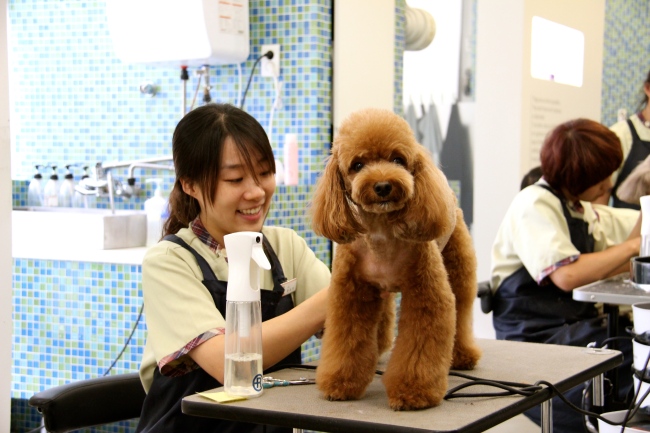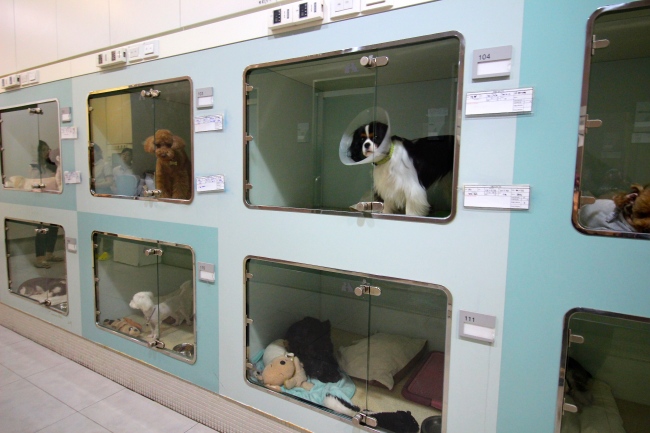Every day, Lee-seul, Byul and Dal-rae get dropped off at a kindergarten in Seoul by their mom.
Throughout the day, they play with their friends under the supervision of their teacher, who instructs them on how to properly behave at home. When evening approaches soon after snack time, the three wrap up their day and head home.
This may sound like a typical trio of youngsters, but unlike other kindergartners they are all schanuzers, which Kim Mee-hyun, 57, says are “basically like her children.”
At times, she admits, she dotes on them even more.
Every month, Kim spends about 1 million won ($900) ― sometimes more ― on caring for her dogs. Regular expenses include organic dog food, sending them to a dog kindergarten for five days a week and grooming them to look their best.
 |
A stylist grooms a dog at Irion’s grooming salon (Julie Jackson/The Korea Herald) |
“They are a part of the family and there is no reason why I’d ever feel like I’m spending too much on caring for my babies,” she said.
In South Korea ― a nation faced with an aging society and the rise of single-person households ― the number of dog owners recently surpassed 10 million. As roughly 1 in 5 Koreans now owns a dog, there are many others like Kim who are seeking only the best for their beloved canine companions.
Eyeing such new market potential, the nation’s pet industry has developed a range of new, lavish services for man’s best friend ― ranging from premium pet care options and television channels for dogs to pet hotels, pet insurance, high-end dog clothing and accessories, all-organic pet foods and even full-on dog funeral services.
Irion, a leading animal hospital located in Gangnam-gu, Seoul, offers not only basic medical services for pets, but also a range of other premium treatment options including stem cell injections ― which can cost up to 2 million won ― endoscopies, abdominal ultrasounds, platelet-rich plasma injections, physical therapy, cancer treatment and obesity clinics.
“If people in the past visited hospitals mainly to treat sick dogs, they now seek broader preventive medical services such as routine health checkups and regenerative therapy including stem cell injections ― all areas which are forecast to further develop in the years to come,” said Kim Tae-ho, a veterinarian at Irion.
The hospital also operates a pet day care and pet hotel for those who cannot take care of their dogs for various reasons. Hotel prices range from 40,000 won to 120,000 won per night for the private rooms equipped with surveillance cameras that send live footage to owners via mobile devices.
 |
Irion’s dog hotel (Julie Jackson/The Korea Herald) |
Meanwhile, pet salons have developed new grooming styles and spa programs to meet the changing demands of pet owners. The most popular haircuts today include the “teddy bear cut” and the “broccoli cut,” with the “Mohican cut” offered as an option for those seeking a more unique look for their pets, according to an Irion stylist.
“Though the U.S. has the most advanced pet industry in the world, Korea’s ability to provide high-class premium and detailed services demanded by dog owners is unmatched by any other country,” Kim said.
Another standout service that has caught the attention of dog owners here is Dog TV ― a television channel that provides tailored company for dogs left alone at home. Moreover, many pet owners are turning to firms specializing in dog funeral and cremation services, seeking to bid a proper farewell to their longtime companions after they die.
As services diversify, the pet industry here continues to expand at a rapid pace. The domestic pet market ― currently valued at roughly 1.8 trillion won ― is forecast to reach 6 trillion won in size by 2020 and is continuing to record a two digit growth every year, despite the economic downturn, according to a 2014 report by Nonghyup Economic Research Institute.
“The demise of the traditional family structures has led animals to become concrete members of the family who are loyal and welcoming to their owners. As more people become attached to their dogs, the related industry in turn grows, fueled by new demands,” the Irion veterinarian said.
By Sohn Ji-young (
jys@heraldcorp.com)









